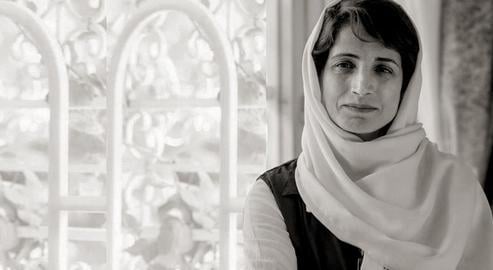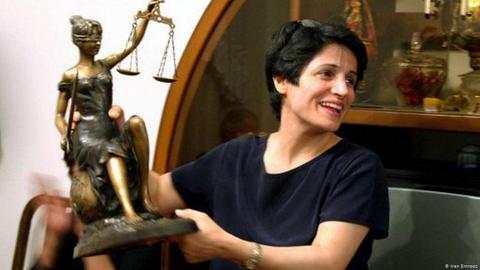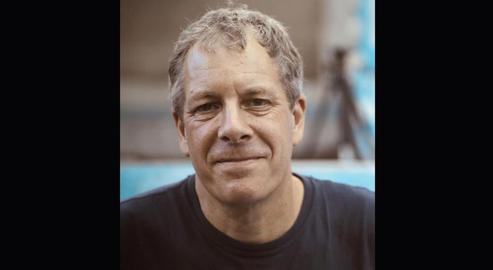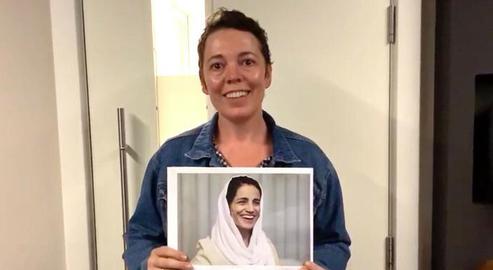Last month a feature-length documentary, Nasrin, was released that covers life and struggles of Nasrin Sotoudeh, the world-renowned Iranian human rights lawyer imprisoned in Iran for her defense of civilian activists.
For the next ten days, in partnership with the creators, IranWire has made the English-language film available online to Persian-speaking audiences outside of North America. To mark the release, we spoke to director Jeff Kaufman about the process of making the film and what he hopes it will achieve – and to Nasrin’s husband Reza Khandan, who was recently reunited with his wife during her temporary release from prison.
***
The film opens with the descent of an elevator. Nasrin Sotoudeh emerges, and tells the camera that she is on her way to court to pursue the case of a little girl sexually abused by her father. While driving through the streets of Tehran, she explains the details of this harrowing case.
From the very first moments of Nasrin through to the close, American director Jeff Kaufman is at pains to present – for a precious hour and 24 minutes – the remarkable highlights of Nasrin Sotoudeh’s professional career, and to a lesser extent her personal life, and what was at stake for her as she bravely defended others in Iran.
The release of Nasrin could not be more timely. Nasrin Sotoudeh was recently released from the notorious Qarchak Prison on medical furlough after contracting Covid-19. She had been transferred to Qarchak in late autumn after abandoning a 50-day hunger strike in Evin Prison in protest against the conditions inside: the latest of several since she was first detained in 2018. The 57-year-old still faces a 38-year prison sentence for her work defending civil rights activists in Iran, in a symbolic case that has attracted condemnation across the globe and was pronounced “unfathomable” by the UN.
This intimate portrayal of Nasrin Sotoudeh’s life and work was clandestinely filmed by Iranian videographers, who risked their lives and whose identities are being kept secret. Mid-way through the filming, Iranian security agents showed up at Nasrin’s home, triggering the chain of events that would lead to her sentencing in March 2019.
This not the first film Jeff Kaufman has created that addresses issues of social justice and human rights in Iran. His other credits include Documenting the Feminist Movement’s Struggles in Iran (2020), 40 Million: The Struggle for Human Rights in Iran (2020), and Education Under Fire (2011). It was through these ventures that he came to know Nasrin Sotoudeh.
"One of the films I made,” Kaufman told IranWire, “with the help of Amnesty International, was about the persecution of the Baha'i faith in Iran. One of the great champions of religious minorities and Baha’is in Iran is Nasrin Sotoudeh.
“In 2016 we reached out to Nasrin through mutual friends and asked if she would be interested in a documentary. I think one of the reasons she said yes was the idea that through her, we could connect to a community of activists, and also because she so believes in the arts as a tool for moving society forward.
"One of the goals of the film, right away, was to humanize the Iranian people and Iranian culture to people who don’t really understand it, and to break down barriers that are put up for the wrong reasons. We’re delighted that through access to Nasrin, we could touch on parts of life in Iran that we don’t normally see.”
The film’s producer, Marcia S. Ross, is married to Kaufman. "She has been part of every single step of the way. We lived the film in every aspect,” says Kaufman. Other key contributors included Iranian human rights activists such as Hadi Ghaemi, the director of the Campaign for Human Rights in Iran, and Jason Rezaian, a journalist and former political prisoner. The film also features interviews with the Nobel Peace Prize-winning Iranian lawyer Shirin Ebadi, writer and former prisoner Taghi Rahmani, and women’s rights activist Mansoureh Rezaei.
"I couldn’t go to Iran,” Kaufman told IranWire, “because I’d already made four or five other films about Iran. Even if I could, showing up with a large film crew and following Nasrin Sotoudeh around would get it stopped before you started. So we connected with a number of talented, courageous filmmakers who both followed Nasrin and got to other aspects of Iran, as well as people who took a series of photographs.”
One of the contributors, Kaufman said, was an Iranian freelance photojournalist named Alieh Motalebzadeh. This activist, who took pictures of Nasrin handcuffed in front of the Revolutionary Court, had been sentenced to three years in prison in 2016 for “propaganda against the regime” and was summoned to begin serving her sentence about a month ago.
Nasrin also delves into the landscape of women’s rights in Iran and the struggle for gender equality in the country over the past 15 years, taking in such events as the grassroots One Million Signatures Campaign, the issue of compulsory veiling and the “Women of Revolution Street”. It also covers the 2009 Green Movement and Nasrin Sotoudeh’s defense of activists such as Narges Hosseini and Shirin Ebadi, as well as her two incarcerations and a sit-in staged in front of the Bar Association in 2014 when her license to practice was temporarily revoked. More tentatively, it also explores her private life and treasured relationship with her husband and children.
Nasrin Sotoudeh, the film states, began her career as a bank employee who sometimes wrote articles on women and human rights for Iranian newspapers. "The first time I met Nasrin,” Shirin Ebadi says in the film, “she was a journalist, and she was interviewing me. At the time I was president of the [Iranian] Association for Support of Children's Rights. After the interview, I asked her why she didn’t become a lawyer. Two or three years later, she did become a lawyer."
Elsewhere in the film, Nasrin’s husband Reza Khandan recalls that the pair met while working for Daricheh magazine, where he was then working as a graphic designer. In his usual, steady manner, he tells the camera: “It was really hard to tell her my feelings. One day we went to the mountains... I risked it, and told her."
The pair got married on October 7, 1995 and their few remaining wedding photos are also shown in the documentary. Reza Khandan says the rest of the photos and videos from their wedding day have since been destroyed.
Jeff Kaufman told IranWire that he was careful not to portray Nasrin in a symbolic light in the film. “We didn’t want Nasrin to be a plaster saint,” he said. “That’s not good storytelling, and it doesn’t give any guidance to how other people can change the world. You need to know who the person is and what their sacrifices are, and what they love, to have an understanding of what they’re doing.”
Kaufman says that his wife, producer Marcia S. Ross, calls Reza Khandan “Nasrin’s own Martin Ginsburg”: a reference to the husband of the late US Supreme Court justice, Ruth Bader Ginsburg, who passed away in September 2020. "She had a husband who was just as smart and passionate as she was,” Kaufman says, “who would do anything to support his wife. Reza is that kind of remarkable person.” He added that he hopes both Iranian and US officials will see the film.
What happened to Nasrin Sotoudeh after the filming concluded is now well-known. Aside from the persecution she herself suffered, up to and including the transfer to Qarchak Prison, the Iranian authorities have also targeted her family. Her daughter Mehraveh was arrested in August 2020 and summoned to the Revolutionary Court, seemingly as punishment for her mother’s ongoing hunger strike.
"We were heartbroken when Nasrin was arrested,” Kaufman says. “We were terrified during her hunger strike. But it was amazing to realize that this small, fragile woman, locked away in one of the worst prisons in the world, could still find a voice and reach the world. The indifference the regime showed to her and others is horrifying.
"So many like her are at risk right now. We hope that by bringing attention to Nasrin’s story, the Iranian authorities, who represent so many good people, will open the doors to political prisoners and let them go home to their families.”
Reza Khandan: “This Film is a Part of Our Lives”
Reza Khandan features prominently in the Nasrin documentary, and emerges in the film as a full-fledged protagonist: just as he is in real life, and in his relationship with Nasrin Sotoudeh. In all their years together, the pair have worked side by side. They are often pictured together in the media, holding up placards at demonstrations and visiting the families of political prisoners. As Nasrin’s life-long companion, Reza Khandan has always been an activist in his own right – and like his wife, has dealt with his own share of interrogation and detention at the hands of the Iranian authorities.
Talking about his personal life on camera, it transpires, still does not come easy for Khandan. Of the process of making the film, he tells IranWire: “We considered [media coverage] to be a normal part of our lives. But going in front the camera and talking about one’s personal life is a hard thing, especially for me.”
Asked how far the film accurately depicts their life together, he says “Of course, no film can show all the realities of people's lives. Especially since the focus of this film is on the moment it was filmed.
“Tthere were also parts that were omitted due to individuals’ personal and social rights – some of which were fairly important scenes. There were figures that had a special relationship to the issues [at stake] and to Nasrin herself, and we would have liked to have shown their role, but life isn’t perfect and there are consequences that have to be taken into account.”
Since Nasrin’s arrest in 2018, Reza Khandan has acted largely as a lone parent to their two children, 19-year-old Mehraveh and 13-year-old Nima. “A lot had been said about my role as a father even before this film,” he says. “But I don’t feel that I have done anything extraordinary. In my opinion, this was the most normal response, one which any father would have had."
Khandan also told IranWire that he was impressed by the final cut of the film. "One might assume that a documentary about someone whose life is intertwined with arrests, imprisonments, trials and executions would be full of scenes of violence and have a heavy, doomy atmosphere. But But this is not case. The subtlety of the film, despite the brutal themes, I think is its finest quality. That and the fact that – while perhaps for citizens of Iran, the geography and cities of Iran are unremarkable – for those who have never visited Iran, it will hold a special charm.”
Nasrin Sotoudeh herself has also recently seen the film. Of her reaction, her husband says, “This film is a part of our lives. It should be normal to see scenes from our own lives."
Aside from the subjects, a consortium of other famous figures and talented individuals helped bring the film to life. They included the British actress Olivia Coleman, who provided the voiceovers, Tyler Strickland, who wrote the original score, Lynn Ahrens and Stephen Flaherty, who wrote another original song for the film performed by Angélique Kidjo, and editor Asher Bingham. “Dozens of people worked together in various ways to make the film,” Reza Khandan says. “And we have to sincerely thank each and every one of them."
Related coverage:
Nasrin Sotoudeh Tests Positive for Coronavirus
Nasrin Sotoudeh’s Health Deteriorating in New Prison
Human Rights Attorney Vows to Continue Hunger Strike in Prison
Published: The Official Verdict Against Nasrin Sotoudeh
Iran's Female Political Prisoners
visit the accountability section
In this section of Iran Wire, you can contact the officials and launch your campaign for various problems





























comments